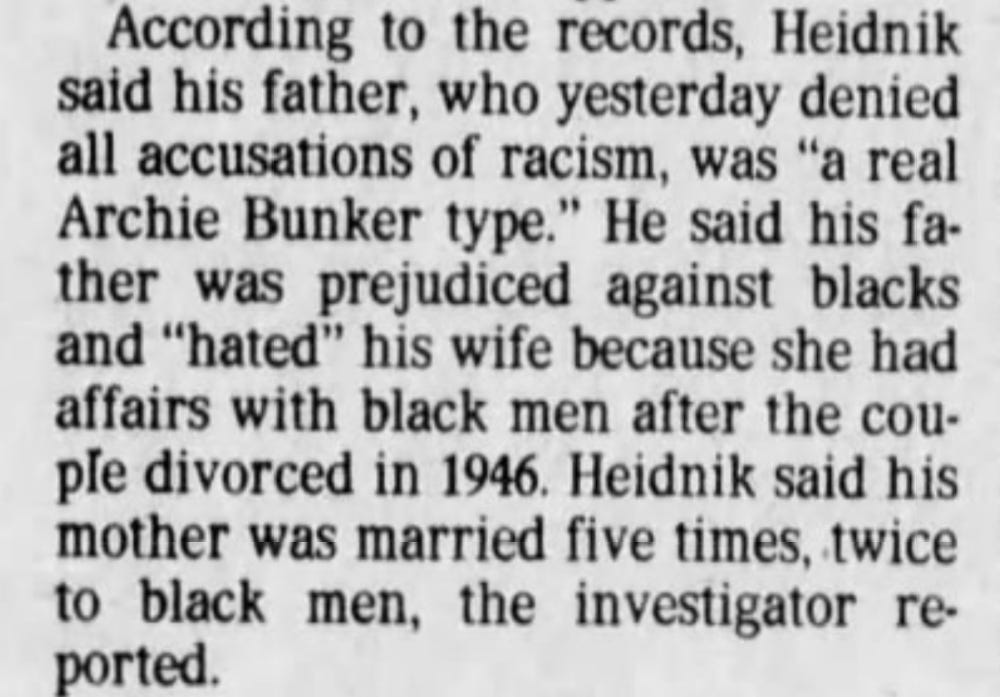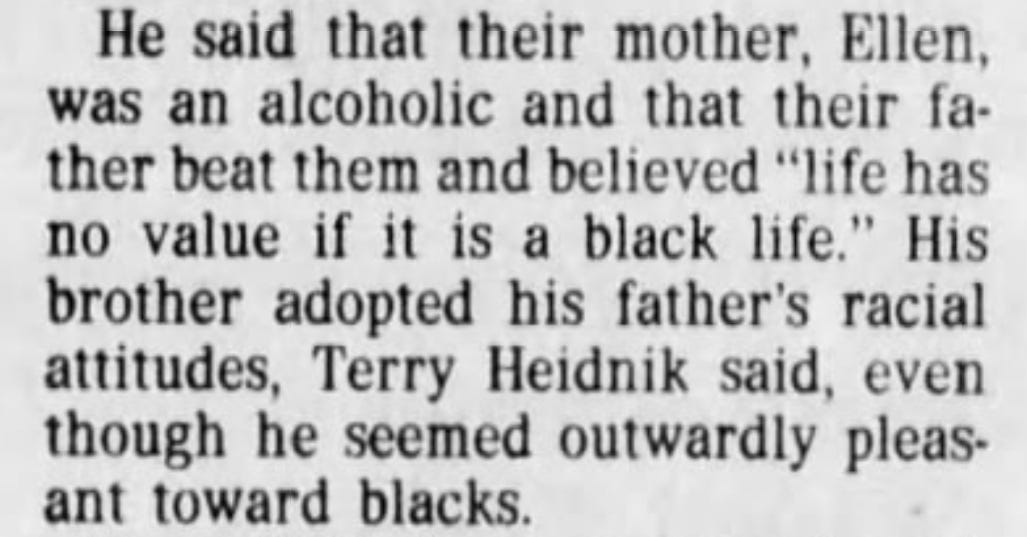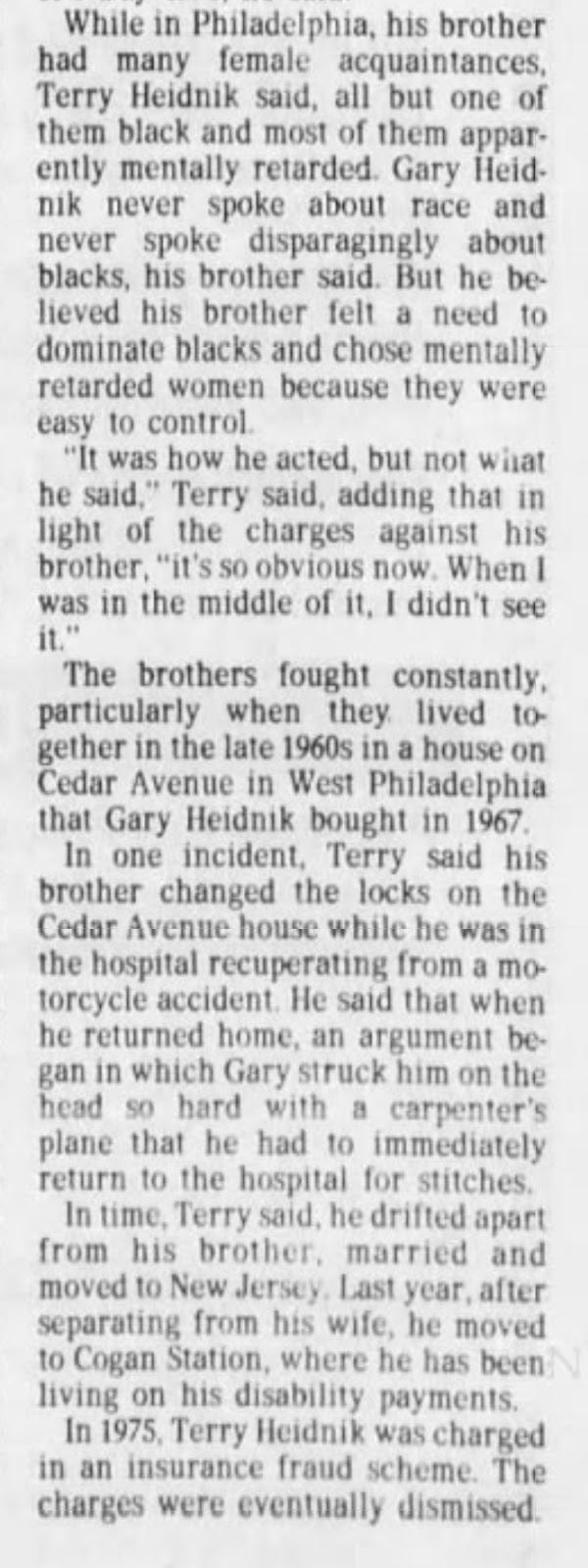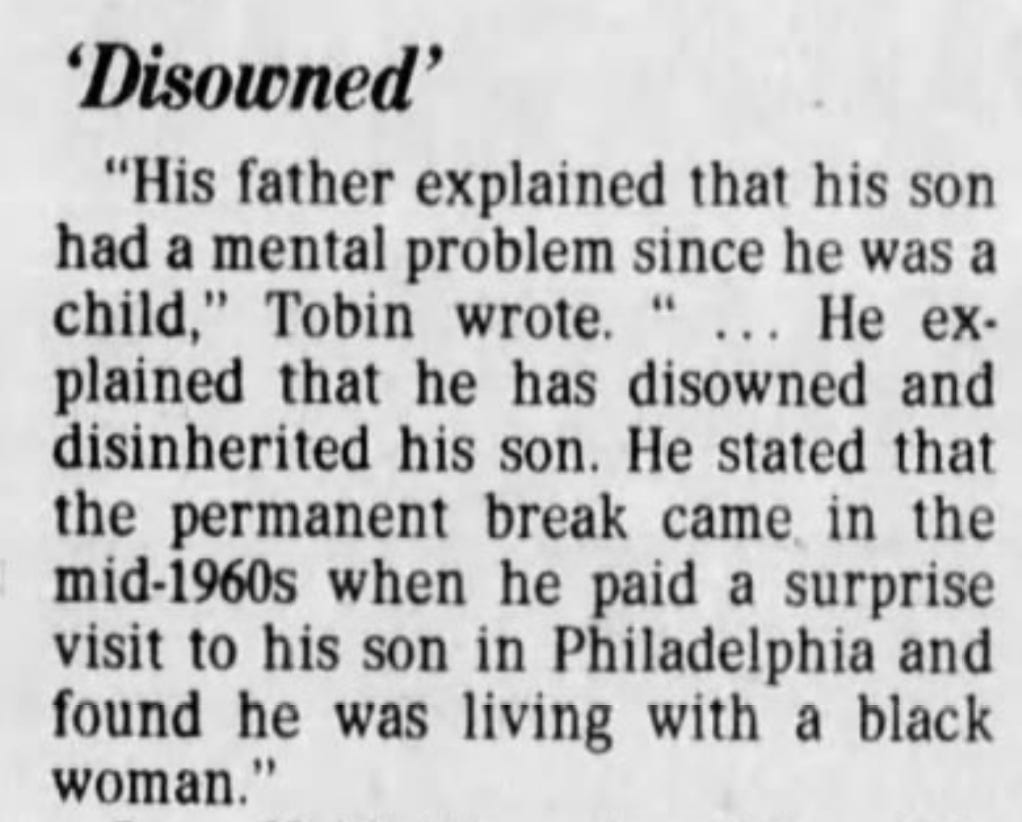Death Row Last Meals - Gary Michael Heidnik
As a special bonus to our paid subscribers, and to show the ridiculous amount of work that some of these videos require, we thought we’d publish the work that the 2 part Gary Michael Heidnik Death Row Last Meals documentary is based on (with no editing).
This is NOT a script or an article; it is 38,538 words of largely unedited notes. Let that be a warning to anyone who reads it - it’s kind of a mess and very unorganized. The full hundred plus pages of disorganized mess are available beneath the nested video below only to paid subscribers. There is a generous amount available to free subscribers as well.
Heidnik Notes
Gary Michael Heidnik: father, husband, nurse, army veteran, ordained minister, stock market shark, paranoid-schizophrenic, kidnapper, serial rapist, torturer, and murderer. He is known for kidnapping six African-American woman and keeping them locked up as sex-slaves in the basement of his house in Philadelphia. Two of the six women never made it out. Heidnik once allegedly survived eating a lightbulb and used to sign his name as G.M. Kill. Gary is also known for being the inspiration for the character of “Buffalo Bill” in the novel The Silence of the Lambs by Thomas Harris, which was first published in 1988. He was executed in 1999, eight years after Silence of the Lambs was released. His last meal consisted of two pieces of cheese pizza and two cups of black coffee.
You will find references to multiple books, legal documents and articles, the most interesting of which are the works of Dr. Jack Apsche, a psychiatrist hired on as a researcher by Gary's Lawyer Chuck Puerto during his trial from 1987 to 1988. Jack received more than 25 letters from Gary totalling 151 pages of material which is rarely talked about. One letter in particular covers serial killer Harrison Frank “Marty" Graham.
About this letter, Jack writes, "It is a quirk of history that two serial sex killers were arrested in the same section of the same city within months of each other for very similar crimes; that both suffered from chronic mental illness; that both pled insanity – unsuccessfully; and that they came to befriend each other in the same jail."
EARLY LIFE
Gary’s father was Michael Frank Heidnik, who was born on October 12, 1912 in Cleveland, Ohio and died March 8, 1996 in Lake County, Ohio. Gary’s mother, Ellen Isabelle Vendervoot, was born October 21, 1918 in Cleveland, Ohio (where she also died on May 31, 1970).
They married on June 1, 1940 in Cuyahoga County, Ohio, and three years later Gary Michael Heidnik was born on November 22, 1943 in Eastlake, which is a suburb of Cleveland. About eighteen months later, on April 21, 1945, his younger brother Terry Frank Heidnik was born.
About six months later in 1946, when Gary was three years old, Michael and Ellen divorced. Gary’s mother, Ellen, was an alcoholic. Michael, his father, was abusive. Both Gary and Terry stayed with their mother and her new boyfriend to be raised in the Cleveland suburbs. They had a hard childhood.
In an Associated Press interview from April 3, 1987 Terry said that during this time, when Gary was six years old,
“...Gary fell 20 feet from a tree, suffering a severe injury that left his head misshapen. [Other] children began calling him ″football head,” and he became more violent and his personality began to change.”
About his childhood Gary said:
"As I mentioned previously I have managed to overcome the perception of being retarded as a child. I have flunked second grade once and was about to flunk again when dad worked with me and made me learn. Even better he started a fire in me where by I liked to read books. (That reading) became a problem since it warped my sense of reality. I couldn’t see things as they really were I saw them vicariously through the eyes of people like Edgar Rice Burroughs."
Gary would later be determined to have an IQ of 148. In another letter he says:
"I’ve always had problems with my memory, but it’s important to remember I’m really not VERY BRIGHT!! It takes a lot of effort on my part to achieve the educational levels I have made. But I do it with a little extra effort and an analytical mind. When something puzzles me or if I have a problem I will spend hours on it trying to solve it in an analytical fashion. Like I can play a tremendous game of chess but it takes me so long, it drives the other players crazy. I’ll study each and every move until I’ve analyzed most possibilities and then make my move.
I’m good in vocabulary though which boosts my I.Q. score, but vocabulary is largely memorizing. With my love of reading they reinforce each other. But I’m SLOW! Since I am so slow (mentally) I can only devote so much time to the most important matters. In schools, for instance, I had no social life. No parties, friends, girls, zip!! I used that time to study and get good grades, and please my father. As I’ve mentioned previously I’ve managed to overcome the perception of being retarded as a child. I flunked second grade once and was about to flunk again, when Dad WORKED with me and made me learn. Even better he started a fire in me whereby I LIKED to study and READ books.
That became a problem since it warped my sense of reality. I couldn’t see things as they really were, I only saw them vicariously through the eyes of people like Edgar Rice Burroughs. I used to think when I was about 14 or 15 that I could live in the woods, hunt with a knife (and air rifle*) and swing through the trees. REALLY!! I actually thought I could swing through the trees like Tarzan and run away from home to do so.
The biggest way books and lack of social life warped my thinking is in regards to interpersonal relationships. I couldn’t see or relate with people as they REALLY are. I always perceived* them vicariously through the eyes of fiction writers. People aren’t like the ones in the fictional stories, especially in the books available in the 50’s."
Dr. Jack Apsche said of Gary:
My opinion is that Heidnik was both highly intelligent and learning disabled. In fact, it is not uncommon to find mentally gifted children who also suffer from Attention Deficit Disorder and other learning disabilities. Conversely, learning deficits can sometimes conceal a gifted child’s high intelligence. Heidnik learned to use his high intelligence to compensate for his particular learning deficits.
In letter 20, Gary writes Jack about a theory he has about his mental issues:
"Oct 17, 1989 Dear Dr. Apsche, For reasons of purely scientific veracity, I suggest you explore possibilities of a mild case of Fetal Alcohol Syndrome. My mother was a documented alcoholic and also complicated by smoking. Suggest you check my elementary school records at Henry W. Longfellow in East Lake, Ohio. Do you recall that I flunked second grade almost twice! The more you check into the symptoms the quicker you’ll become a believer. Things like my “tic” for instance may have been a manifestation."
Five years later, Gary and Terry were handed over to his father, who was then living with his new wife Dorothea. Terry said that their childhood was marked by frequent beatings from their father, to the point where, ″…we’d be afraid to pick anything up because he’d beat us if we dropped something like a glass or something. I was knocked unconscious once.″
Michael Heidnik worked for Chase Brass & Copper Co. in Euclid, Ohio starting in 1932 as a tool-and-dye maker. He went on to become an Eastlake Councilman, and everything written about him points to him being very strict. One of those "my kids not gonna be a pussy” types. He also told a story about how they were sometimes forced to wear pants with a bull’s-eye on the seat. Classmates and their father both would kick the bull’s-eye.
In addition, Gary suffered from chronic enuresis, or bed-wetting, which he would struggle with for most of his life. It’s unclear if this was primarily nocturnal enuresis, bed-wetting at night, or diurnal enuresis, bed-wetting during the day. Some children experience one or the other but some have a combination of both.
Children at risk for this may not have regular bathroom habits, they might have physical development problems and anxiety. The diagnosis has to be at or after age 5 and it has to happen at least two times a week for three or more months. It sounds like Gary would meet this criteria because he was older than five and is described as having this problem chronically but there is no evidence about an official diagnosis of some kind.
Regardless, Gary was punished for this by his father. Maybe his father thought that humiliation would deter his son from this behavior. It’s clear Michael didn’t understand that this is never the child’s fault and it’s emotionally abusive to make it their fault.
Michael would have Gary hang his urine stained bed sheets out his window for everyone to see. There are reports that his father would lock him outside in his urine-soaked underwear as punishment for wetting his bed but this information exists in a limited number of sources. It could be true.
Bullying is taken very seriously now but it wasn't so much back then and Heidnik, at that point in his life, was a victim of those around him. They made him feel small and insignificant. As a kid, Gary would read the financial section in the newspaper. He used to say, “one day, I’m going to be a millionaire.”
During a personal interview that Jack conducted with Gary, Gary said, “...fantasy is better than reality, nothing can go wrong, it’s the way you want it.”
That really encapsulated Gary. Gary was an outcast, he was a loner. On top of being made fun of for his football shaped head,
"It also appears that Gary would often preferred to spend time alone rather than with others. Thus his reading gave him an excuse to be alone in his fantasy world. Reading then helped to fill a void, actually it became an unknowing fuel for his fantasy life."
-- "By both Heidnik’s’ brothers description dad was a stem disciplinarian. Terry described out right abuse by the father. “He actually hit Gary on the head with a board and hung him out of his 3rd floor bedroom window by his feet.”
In his 4th letter to Dr. Apsche on November 13th 1988 he writes:
"By the way, where did you get the information that my father hung me out the window by my feet? That never happened. My father was a strict disciplinarian, but he was never cruel."
So… who knows about that story? Terry says it happened and G.M. Denial says it didn't. Gary had early signs of psychological dysfunction which became most apparent at school. When he was young, he would never make eye contact with other students. When it comes to social skills, eye-contact avoidance is an early sign of autism.
Though there are no sources suggesting that he might be autistic, later in life he would hang around a nonprofit for people with autism called the Alwin Institute to pick up women to take home and have sex.
Needless to say, Gary was a socially awkward kid. He was a good student, smart but awkward. There is one story when a new female student asked, "Did you get the homework done, Gary?"
He yelled at her, and told her she was not "worthy enough" to talk to him. Eventually, he and Terry returned to live with their mother. In addition to a succession of boyfriends and husbands, she had severe drinking problems and at one point was arrested for theft. On one occasion his mother forced him to steal money so she could buy cheap wine and whiskey.
As to her relationships, a couple of Ellen's partners were black men. This particularly angered Michael, and had a big impact on Gary who as we know would go on to be exclusively sexually attracted to black women.
By the time Gary had reached the eighth grade he had developed two main obsessions, making money and becoming an army officer. In eighth grade he wore oversized military fatigues everywhere and really wanted to go to West Point.
So intense was the latter ambition that his father made arrangements for him to attend the prestigious Staunton Military Academy in Virginia.
Gary lasted at the academy for two years attaining excellent grades but left suddenly in his junior year and returned home to live with his father. Within the next year he tried two different high schools but soon became bored and left after a few weeks. At the time he dropped out, he was 17 and waiting until he could enlist in the U.S. Army.
Military
At age eighteen he joined the regular army. Heidnik later told prison psychologists that he left Staunton after visiting a psychologist but failed to indicate why he had felt he needed one or give details of his treatment.
In 1961, when he was 18, he went to Army basic training and researching this I kept seeing the same information over and over and by information I mean this one sentence:
"His drill sergeant marked him as excellent”.
Chapter 5 of Cellar of Horror by Ken Englade offers more significantly more information.
Gary wanted to be in the military police but was rejected. Instead he was stationed in San Antonio, Texas to train as a medic, which he also excelled at and was very quickly assigned to the 46th Army Surgical Hospital in Landstuhl, West Germany. After just a couple weeks in Landstuhl he got his GED.
In August 1962, Heidnik began complaining of severe headaches, dizziness, blurred vision, and nausea. He went to the hospital and saw a neurologist who diagnosed Gary with gastroenteritis, an intestinal infection. Symptoms include diarrhea, cramps, nausea, vomiting, and fever, generally accompanied by lethargy, fatigue, and lightheadedness.
The neurologist diagnosed him with gastroenteritis but also noted that Gary exhibited symptoms of mental illness, either schizophrenia or schizoid personality. Subsequently, he was prescribed trifluoperazine, which is used to treat the symptoms of schizophrenia - a mental illness that causes disturbed or unusual thinking, loss of interest in life, and strong or inappropriate emotions. Trifluoperazine is also used on a short-term basis to treat anxiety in people who have not been helped by other medications.
Even though Gary was given trifluoperazine to treat symptoms of schizophrenia, perceived by his Army doc, he would later be diagnosed with schizoid personality disorder which is not the same thing. Schizophrenia is a psychotic disorder; Schizoid personality is a personality disorder.
Despite his diagnosis with schizoid personality disorder, this would be a point of debate for some reason. Later in court it would be said that he was schizophrenic not a schizoid personality. On the other hand, the prosecution was saying that he had planned to present these symptoms before he even joined the army.
In 1962 the first DSM or diagnostic and statistical manual of mental disorders was available. It had been published ten years prior in 1952, released during the Korean War. It was compiled from a combination of military experience and psycho-analytical theory. Now, of course, we have the DSM-V, which was published in 2013. So, it’s been revised a few times.
In the DSM I, so how Gary would have been diagnosed at the time, a Schizoid personality was defined by avoidance of close relationships, inability to express aggressive feelings, and autistic thinking (thinking which is preoccupied with one's inner experience).
The DSM-II updated the definition to include daydreaming, detachment from reality, and sensitivity. In the DSM-III, schizoid personality disorder now included difficulties forming meaningful social relationships and a persistent pattern of disconnection and apathy.
There was a move to remove schizoid personality disorder from DSM-5 which was unsuccessful. The current definition is as follows:
A persistent pattern of disinterest from social interactions and a limited variety of expression of emotions in a close personal settings, starting in early adulthood and there in an array of contexts, as shown by at least four (or more) of the subsequent:
neither wants nor likes close relationships, counting being part of a family
almost constantly picks introverted activities
has little if any, thought in engaging in any sexual experiences
seldom derives pleasure from any activities
has no close friends other than immediate relatives
appears apathetic to the admiration or disapproval of others
shows emotional coldness, detachment, or flattened affectivity
They’re a little bit different, and also, times have changed and the system is more sophisticated. If Gary was milengering, he may not have been able to fake it in the 21st Century.
Years later when Gary Heidnik is arrested and people in his circle are questioned it becomes clear that part of this was a stunt. Firstly, John Cassidy, Heidnik’s best friend in Philadelphia who he met after getting out of the military says this, “I met Gary in ’74 or ’75 in Philly. He claimed the Army gave him LSD while he was in Germany. Sometime over there, he had a nervous breakdown. A legitimate, real nervous breakdown. And then he said he got this brilliant idea. He said, when he came out of it, why the hell should I come out of it if I can get disability?”
Regarding Gary’s claim that the Army gave him LSD. Dr. Jack Apsche said this:
In addition, the prosecutor, Charlie Gallagher, Philadelphia District Attorney’s Office said, “In the ’60s, he went in the Army and he wanted to get a certain kind of training, but they ended up training him as a medic. Then they sent him to Germany, and I think he didn’t like the assignment, didn’t like being in Germany. So he started thinking, “How can I beat this?” He just stopped obeying orders. He finally got them to give him a medical discharge. Eventually he wound up with 100 percent disability, because he was able to convince the doctors that he was crazy. He’s been faking all his life.”
Gary is obviously sick but high functioning and cognisant enough to present himself as very low functioning. Regardless, he is withoutadoubt ill.
Soon after this, in October of 1962, Gary was transferred to a military hospital in Philadelphia, Pennsylvania. Where was diagnosed with schizoid personality disorder and consequently honorably discharged from military service.
Adult Life
In 1962, shortly after his discharge, Heidnik was working as an LPN, a licensed practical nurse. He worked at a Department of Veterans Affairs hospital in Coatesville, Pennsylvania, where he struggled to maintain a schedule and also interact appropriately with people. He was fired for being rude towards patients and also for his poor attendance.
He received his license soon after and began his career as a practical nurse in Philadelphia only. Simultaneously, Heidnik also decided that he would start attending school and enrolled at the University of Pennsylvania to study medicine. Heidnik’s working years were not good; like many other individuals who later turned into heinous monsters, keeping a job was a major problem for him.
He had started a new job as a psychiatric nurse at the Veterans Administration Hospital in Coatesville. This was a bad position for a man who thought himself to be superior to others. His experience as a psychiatric nurse was not good at all, primarily because he didn’t know how to deal with mentally ill patients. According to his peers, Heidnik was often enraged when treating patients. Whereas nurses are trained to be very careful when dealing with mental patients, Heidnik didn’t care at all. He was often seen scolding patients in private, and there were even reports of him manhandling certain patients. It wasn’t long before the hospital decided that Heidnik’s time was up and fired him. The reasons cited in the official report stated that Heidnik had very poor attendance and was also quite rude towards his patients.
He tried going back to school & moved to Philadelphia where he took courses at the University of Pennsylvania but really wasn’t cut out for it. He dropped out after just one semester.
Basically Gary was surviving on full disability from the Army. He purchased a three-story house on 4705 Cedar Ave in West Philadelphia in the Garden Court neighborhood and rented out the top two floors. It was around this time that Gary started hanging out at the Elwyn Institute, a school for the developmentally disabled.
There was a neighbor who lived across the street named Alice and Alice said that women would come in and out of Gary’s place all the time. She described the women as “child-like”.
Alice said that there was one particular woman named Dorothey who really stood out to her. She said Dorothy didn’t talk much, she was very quiet and meek. Apparently residents of Garden Court were concerned for her and brought her stuff like food and clothes and whatever else they wanted to donate to help her out because they said it seemed like she was being abused.
Alice told this story, “Gary owned this boat that had an open top. And sometimes Gary would punish Dorothy by making her sit out in the boat for hours at a time.”
Some of the neighbors, including Alice, reported this and other incidents to the police. Nothing happened. The cops would come out, look around and leave.
Gary started working with intellectual disabled people in 1967, and it was about a year after that when he met Dorothy. Dorothy wasn’t Gary's first relationship with a black woman. He had dated three black women before her.
ADD:
Gary’s grandfather on his dad’s side was Frank Hajdnik; he was born in 1976 in Yugoslavia and immigrated to the US from Austria. He changed the spelling of their family name from Hajdnik to Heidnik.
Gary’s mother was Ellen Isabelle Ott. She and Michael married June 1st 1940. Michael had actually been married a few years before to a woman named Dorothy Bruss. They married in Cuyahoga, Ohio on April 27, 1935.
I had difficulty finding photos of his parents. So here is Ellen from her high-school yearbook at Euclid Shore and here's one of Michael from a newspaper article when he was much older.
He went to Collinwood High School, class of 1931 I believe and I looked through that yearbook and others but could not find him.
And here are photos of Gary’s maternal grandparents. I couldn’t find any of his paternal grandparents.
Here is a picture of Gary’s uncle, William. You can see the similarities between him and Terry but yeah. That's about it.
Anyways, back to the early years.
/
Michael and Ellen divorced in 1946.
I read that Michael was a tool and dye maker specifically. He worked at Chase Brass and Copper Co. in Euclid since 1932. Euclid was a big industrial town during WWII. I also read that Michael was a tool and dye maker.
Ellen had serious problems… listen to this:
Gary went to Henry W. Longfellow Elementary School in Eastlake where he apparently failed the 2nd grade. *couldn't find pics
On Aug 24th 1951 Gary's dad remarried a woman named Dorothea Ann Peterson in Cuyahoga, Ohio
Now, Gary and Terry went to live with him and his new wife, their step-mom. I'm gonna read from the interview Terry gave in 1987. He's at a little cafe, here's photos of him for the article. He tells the reporter about their upbringing and their father's racism… the quote I'm about to read is incredibly offensive. It includes the n-word multiple times. I had to include this because it's so important to understanding Gary. If you grow up hearing such hatefulness spewed by a parental figure… it's going to have an impact on you. And remember this was the 40s and 50s. I mean, racial segregation was the norm when Gary grew up. The process of
desegregation - for schools particularly - really made waves in 1954 with the Brown v. Board of Education case when the United States Supreme Court ruled segregation in public schools unconstitutional aaand it's been decades long process for full integration. I'm not gonna get into the details but…
Fucked up fact: The last school that was desegregated was Cleveland High School in Cleveland, Mississippi. This happened in 2016.
Alright. Here is what Terry said about Michael…
(Read full article)
In a different article:
Thought Terry would later contradict himself by saying that Gary was not racist.
In a different article, Michael said this:
/
Gary went on to East Lake Junior High in 1959.
So, Gary went to Stanton Military Academy in Virginia where he stayed for two years 1960 and 1961.
Here are his yearbooks and class pictures. He was with C Company both years.
Gary went to Eastlake’s North High School but didn’t remain there long. Six weeks later he switched to East High School in Cleveland and that lasted about a month. Sadly, he wasn’t in those yearbooks.
His dad said this:
*Again, this interview is from 1987
/
Military
This is interesting because it results in Gary and Terry ending up in the same psych ward…
Gary stayed in Pennsylvania instead of going back to Ohio. This might have been because he didn't want to go back to his hometown but also I believe his grandparents were from Pennsylvania.
Though his grandmother died in 1968 in Florida so… maybe he had childhood memories visiting them there? I'm speculating because his brother Terry ended up living there too - much later in life though.
/
Gary gets 100% disability. He's getting $1,355 a month. Here is a chart for disability pay from 2021 for comparison.
/
1967 Gary bought his house on Cedar Avenue where he lived with his brother Terry.
/
A girlfriend and a neighbor who were interviewed about Gary after his arrest talked about him while he lived at Ceder Avenue:
Apparently, this is around the time Gary's father Michael disowned his son.
Dorothy Knox
Before I can talk about Dorothy, I feel like it’s important to address Gary's love life in general real quick.
Now when it comes to Gary’s love life… his friend John Cassidy said he always dated Black women with mental disabilities. Gary has a type…
I can’t speak for how Gary felt about this but I believe that’s called racial fetishization which is so interesting because it turns into this conversation of like, is that racist?
Some people say no, other people say yes.
I found a quote by this writer named Jadon-Maurice Forbes wrote an article in 2020 called, “The Fear of a Black Fetish”
“...racial fetishization is often held to a different standard than other forms of racism because, the argument goes, it’s just a form of preference and attraction. In reality, it’s nothing more than dehumanization.”
Like, you only like her cause she's black and not for who she is. I think that's probably on an individual basis…
So, he’s got a thing for black women but interests aren’t that broad. No, he wants a mentally disabled woman.
This sent me off on another search and I came to the conclusion that this must not be a devotee type thing. A devotee is someone who is sexually attracted to people with disabilities but from what I gather, this is mainly physical disabilities like a fetish for amputees or blind girls. Gary liked women with mental disabilities. One such woman was Gail Lincow. They had a son named Gary Jr. who was put into foster care shortly after he was born.
Okay, 1968 is quite a year for Gary. It's also the year MLK was assassinated - April 4th. Memphis just to put the timeline in perspective.
In 1968 Gary had relationships with several woman. One being Sonia Garrett, she was 7 years younger than Gary and the weird this is, Gary dated her mother Evelyn (Lynn) Wilson.
Evelyn was 20 years older than Gary. She had severe mental illness and intellectual disabilities. Gary dated her for two years in 1967-1968 and they had a daughter together named Angelique.
Okay, so Evelyn's other daughter Sonia… yeah Gary seduces her.
And what's weird too is that before Sonia slept with Gary she was with Terry from 1967-68. Sonia got pregnant and in Jack's words:
Given the timing of her pregnancy and light complexion of her mixed-race child, Gary is convinced that the boy was fathered by Terry, or possibly himself, rather than his father, who is African American.
Also, in 1968 Gary dated a woman named Maxine Roberts before she fell in love with his brother Terry.
Terry and Maxine lived together for six years and had a child before Terry abandoned her.
And also in 1968, Gary met a woman named Dorothy Knox with whom he would developed the longest relationship with though, the two would never have children. They lived together but Gary had girlfriend's and I don’t know how romantic their relationship was… it seemed like Dorothy cooked and cleaned and lived rent free.
This is how Gary described her:
“This is the woman who lived with me for 10 years. She is about 10 years older than me and spent a lot of years at Byberry before I knew her. Her mind had continued to degenerate so badly that she had trouble going around the corner without getting lost and she’d sign any document you wanted for a pack of cigarettes.”
He also said:
"The only person Dorothy would listen to was me, because quite simply she loved me. BOY did she LOVE me. If I just touched her or kissed her she’d melt and get all goo goo. She’d help me cook and clean the house and wash my clothes and iron my uniform cause she WANTED to. YES!"
/
"This woman LOVED me and even if she did have problems that meant a lot to me. Other people get LOVED very easily. They’re popular and get along with others. I DO NOT. So when somebody loves me, it means a HELL of a lot more to me since it happens so seldom."
About Gary's sexual and emotional needs, Dr. Apsche wrote:
"He found a social group, both at work and outside of work, that he could dominate and over whom he could feel supremely powerful. His friends were mentally challenged men, his sex partners were mentally challenged women, and nearly all were African American. His longest relationship lasted ten years from 1968 to 1978, when he cohabitated with Dorothy Knox, who suffered from chronic mental illness and a severe intellectual disability. Previously, from 1967 to 1968, Heidnik dated and fathered a child by Lynn Wilson, another African-American woman with an intellectual disability. Notably, he gave first expression to his deviant fantasies of multiple partners by seducing her adult daughter as well. Heidnik was a king over his intellectually weak subjects. He could act out his narcissistic fantasies of supremacy and sexual dominance. But it was not enough to sate his hunger for power. Deviant sexual fantasies lose their arousing appeal for the serial abuser, who is driven to more extreme fantasies and behavior to gain arousal."
Gary felt he could manipulate them. Gary thinks he’s the smartest guy in the room so, how funny would it be that I have an IQ of 148 and then make a woman with an IQ of 30 your slave and have a baby her?
Now, while Gary and Dorothy were together some bizarre things happened and Gary spent time in and out of mental institutions. He tried to kill himself on numerous occasions.
1970
Then in 1970, on the 31st of May in Cleveland, Cuyahoga, Ohio his mother, Ellen, who had been diagnosed with bone cancer and was suffering the effects of alcoholism, committed suicide by drinking mercuric chloride.
This served to exacerbate not only Gary’s issues, but his brother Terrys as well. This included numerous suicide attempts resulting in more hospital time. I believe at Perrysville.














